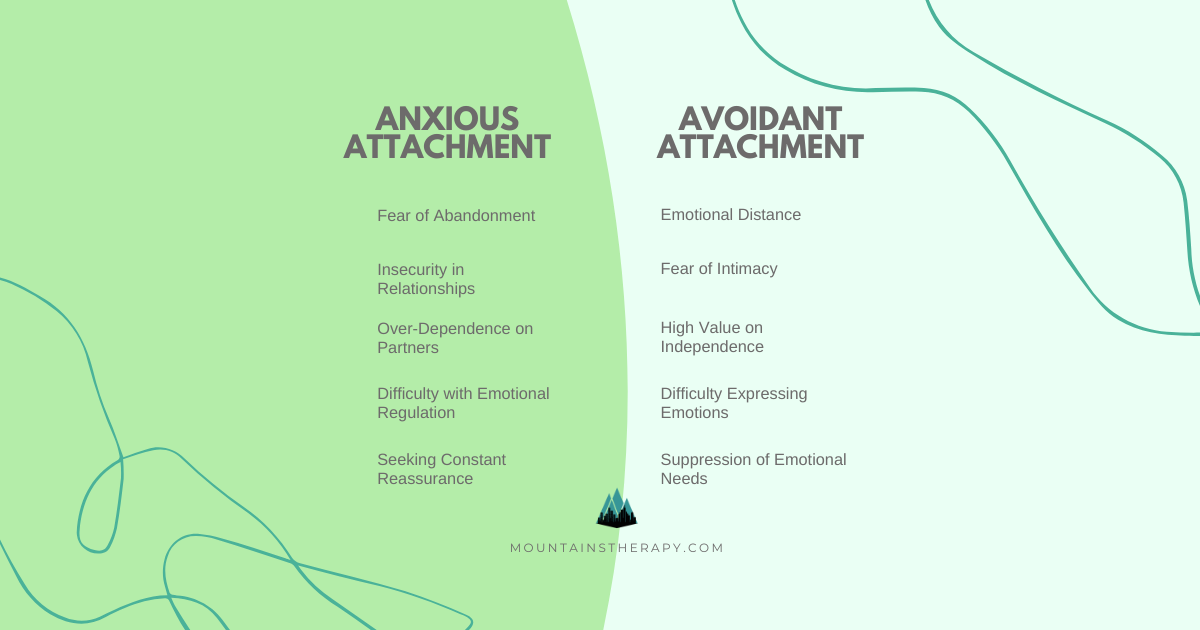What Is the Anxious-Avoidant Trap? Attachment style relationship

Learn more about Attachment-Based Individual Therapy and Attachment Based Couples Therapy.
In This Blog, You’ll Learn:
- What Anxious and Avoidant Attachment patterns are
- How these attachment styles affect relationships
- Strategies to manage the Anxious-Avoidant Trap
- How Attachment-Based Therapy can help
Understanding Attachment-Based Individual Therapy and Attachment-Based Couples Therapy
At Mountains Therapy in Montclair, NJ, NC, FL, and UT, we specialize in helping individuals and couples explore their attachment styles and how they influence relationships. Two of the most common yet challenging attachment patterns are Anxious Attachment and Avoidant Attachment. When these patterns coexist within a relationship, they can create a complex dynamic often referred to as the Anxious-Avoidant Trap, characterized by emotional push and pull, leading to confusion, frustration, and instability.
In this blog, we'll dive into attachment problems relationships, help you recognize signs you have attachment issues, and answer the question 'do I have attachment issues?' We'll also define emotional attachment and provide practical strategies to help you manage these dynamics for healthier, more fulfilling connections.
What is Anxious Attachment?
Anxious Attachment is an attachment style characterized by a deep fear of abandonment and an intense need for closeness and reassurance. Individuals with this attachment style often worry that their partner doesn’t love them as much as they love their partner, leading to clingy behaviors and heightened sensitivity to rejection.
Characteristics of Anxious Attachment:
- Fear of Abandonment: Individuals fear their partner will leave them, leading to clinginess, excessive communication, and a constant need for reassurance.
- Insecurity in Relationships: They often feel insecure, questioning their partner’s feelings, which can result in jealousy, suspicion, and trust issues.
- Over-Dependence on Partners: They may become overly dependent on their partner for emotional support, struggling with being alone and sacrificing their own needs to maintain the relationship.
- Difficulty with Emotional Regulation: Intense emotions like anxiety, anger, or sadness can lead to emotional outbursts or withdrawal when they perceive a threat to the relationship.
- Seeking Constant Reassurance: They frequently seek validation from their partner, which can strain the relationship by appearing needy or demanding.
What is Avoidant Attachment?
Avoidant Attachment is marked by a strong preference for independence and avoidance of emotional intimacy, often stemming from emotionally unavailable caregivers.
Characteristics of Avoidant Attachment:
- Emotional Distance: Avoidantly attached individuals often keep emotional distance, struggling to express their feelings or appearing indifferent.
- Fear of Intimacy: They have a deep fear of intimacy, avoiding closeness to maintain independence and avoid vulnerability.
- High Value on Independence: They prioritize self-reliance and may resist relying on others or feel uncomfortable with others depending on them.
- Difficulty Expressing Emotions: They often find it hard to openly express emotions, preferring to keep feelings to themselves and struggling to verbalize needs.
- Suppression of Emotional Needs: They tend to suppress emotional needs, convincing themselves that close relationships or emotional connections are unnecessary.
The Anxious-Avoidant Trap: Understanding the Dynamic
When individuals with Anxious Attachment and Avoidant Attachment come together in a relationship, it can create a challenging dynamic often referred to as the 'Anxious-Avoidant Trap'.
The Pursuer-Distancer Cycle: In this dynamic, the anxious partner often takes on the role of the pursuer, seeking closeness, reassurance, and emotional connection. Meanwhile, the avoidant partner becomes the distancer, retreating to maintain their sense of independence and avoid feelings of vulnerability. This cycle can lead to ongoing conflict, with the anxious partner feeling neglected and the avoidant partner feeling suffocated.
Emotional Miscommunication: The different emotional needs of anxious and avoidant individuals can lead to significant miscommunication. The anxious partner may perceive the avoidant partner’s need for space as rejection, while the avoidant partner may see the anxious partner’s need for closeness as demanding or overwhelming.
How to Manage Anxious and Avoidant Attachment Patterns
While the Anxious-Avoidant dynamic can be challenging, it is possible to manage and even change these attachment patterns with the right support and strategies.
- Therapy and Counseling: At Mountains Therapy, we offer Attachment-Based Individual Therapy and Attachment-Based Couples Therapy to help individuals and couples understand their attachment styles and develop healthier ways of relating to each other.
- Developing Self-Awareness: Building self-awareness is key to managing attachment patterns. By understanding your attachment style and how it influences your behavior in relationships, you can begin to make conscious choices that promote healthier interactions.
How Mountains Therapy Can Help
At Mountains Therapy in Montclair, NJ, NC, FL, and UT, we understand the complexities of Anxious and Avoidant Attachment patterns and how they can impact relationships. Our experienced therapists are here to help you navigate these challenges and develop more secure, fulfilling connections.
If you’re seeking an Anxious Attachment therapist, an Avoidant Attachment therapist, or want to explore Anxious Attachment therapy and Avoidant Attachment therapy, our team is here to support you. We also provide Anxious Attachment counseling, Avoidant Attachment counseling, and tailored approaches to help you strengthen your relationships and emotional well-being. Contact us to connect with an Individual Attachment Based Therapist or Couple Attachment Based Therapist today!
Answering Common Questions About the Anxious-Avoidant Trap:
Anxious Avoidant Trap: The Anxious-Avoidant Trap refers to the challenging cycle where an anxious partner pursues closeness while an avoidant partner retreats, leading to ongoing relationship conflict.
6 Signs of the Anxious Avoidant Trap: These include emotional push and pull, frequent misunderstandings, feelings of insecurity, avoidance of intimacy, constant need for reassurance, and emotional withdrawal.
How to Break the Anxious Avoidant Trap: Develop self-awareness, practice effective communication, and engage in Attachment-Based Therapy to understand and change attachment patterns.
How to Deal with Anxious Avoidant Trap: Learn emotional regulation techniques, establish healthy boundaries, and seek therapeutic support to manage the dynamic.










